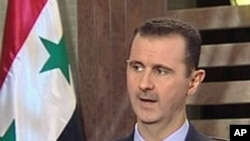Syrian President Bashar al-Assad said in an interview on state television Sunday that the security situation in his country is “improving.” Mr. Assad also vowed to continue a political dialogue with the opposition, move toward a multi-party political system and hold elections.
The Syrian president spent a half-an-hour on state television, saying that he is working toward reform, despite the country's political and security crisis.
Mr. Assad said he understood that the only solution to popular protests is to come to a political understanding with opposition forces. But he added that this could not be done until the unrest was dealt with.
The Syrian leader said that there is no such thing as a security solution, only a political solution, but that when there is a security crisis, "proper methods," including use of the police, security, and riot control forces must be used. Mr. Assad added that he would have chosen the political solution from the beginning of the crisis, but that a political solution cannot succeed without first maintaining order.
The Syrian president also said the country's economy is “improving,” despite economic sanctions by the United States and the European Union. Mr. Assad said Syria has other partners to trade with and that sanctions will not seriously affect on the Syrian economy.
He said that there is no doubt that the crisis has had economic effects, especially with morale, but that the economy has been improving during the past few months, notably in the tourism sector. He added that despite the sanctions, Syria has alternative trading partners.
Mr. Assad called Western concerns over human rights violations, during weeks of a bloody government crackdown “a phony complaint.” He offered several pledges, including steps to recognize new political parties, and to hold local and national legislative elections. Mr. Assad added that his own Ba'ath Party would continue to play a significant role in politics.
Political scientist Khattar Abou Diab of University of Paris says President Assad does not understand the unfolding situation in Syria. Diab says that Mr. Assad continues to claim that the popular uprising in Syria is part of a foreign plot to topple him. He says the Syrian leader does not understand the depth of the crisis, despite Mr. Assad's promises of reform and to hold local and national elections, and that the Syrian president has lost touch with the reality.
Sunday's television interview was the fourth time that Mr. Assad has addressed the Syrian people since popular uprisings began back in March. It was the first time that he has agreed to answer questions put to him by journalists.
Syrian Leader Defends Crackdown




